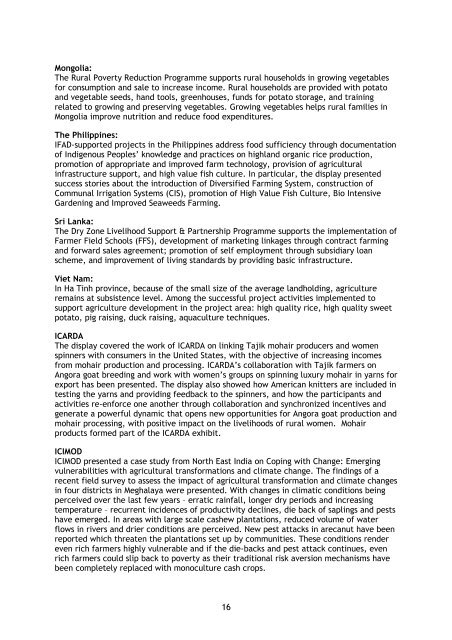Workshop Report pdf - IFAD
Workshop Report pdf - IFAD
Workshop Report pdf - IFAD
Create successful ePaper yourself
Turn your PDF publications into a flip-book with our unique Google optimized e-Paper software.
Mongolia:<br />
The Rural Poverty Reduction Programme supports rural households in growing vegetables<br />
for consumption and sale to increase income. Rural households are provided with potato<br />
and vegetable seeds, hand tools, greenhouses, funds for potato storage, and training<br />
related to growing and preserving vegetables. Growing vegetables helps rural families in<br />
Mongolia improve nutrition and reduce food expenditures.<br />
The Philippines:<br />
<strong>IFAD</strong>-supported projects in the Philippines address food sufficiency through documentation<br />
of Indigenous Peoples’ knowledge and practices on highland organic rice production,<br />
promotion of appropriate and improved farm technology, provision of agricultural<br />
infrastructure support, and high value fish culture. In particular, the display presented<br />
success stories about the introduction of Diversified Farming System, construction of<br />
Communal Irrigation Systems (CIS), promotion of High Value Fish Culture, Bio Intensive<br />
Gardening and Improved Seaweeds Farming.<br />
Sri Lanka:<br />
The Dry Zone Livelihood Support & Partnership Programme supports the implementation of<br />
Farmer Field Schools (FFS), development of marketing linkages through contract farming<br />
and forward sales agreement; promotion of self employment through subsidiary loan<br />
scheme, and improvement of living standards by providing basic infrastructure.<br />
Viet Nam:<br />
In Ha Tinh province, because of the small size of the average landholding, agriculture<br />
remains at subsistence level. Among the successful project activities implemented to<br />
support agriculture development in the project area: high quality rice, high quality sweet<br />
potato, pig raising, duck raising, aquaculture techniques.<br />
ICARDA<br />
The display covered the work of ICARDA on linking Tajik mohair producers and women<br />
spinners with consumers in the United States, with the objective of increasing incomes<br />
from mohair production and processing. ICARDA’s collaboration with Tajik farmers on<br />
Angora goat breeding and work with women’s groups on spinning luxury mohair in yarns for<br />
export has been presented. The display also showed how American knitters are included in<br />
testing the yarns and providing feedback to the spinners, and how the participants and<br />
activities re-enforce one another through collaboration and synchronized incentives and<br />
generate a powerful dynamic that opens new opportunities for Angora goat production and<br />
mohair processing, with positive impact on the livelihoods of rural women. Mohair<br />
products formed part of the ICARDA exhibit.<br />
ICIMOD<br />
ICIMOD presented a case study from North East India on Coping with Change: Emerging<br />
vulnerabilities with agricultural transformations and climate change. The findings of a<br />
recent field survey to assess the impact of agricultural transformation and climate changes<br />
in four districts in Meghalaya were presented. With changes in climatic conditions being<br />
perceived over the last few years – erratic rainfall, longer dry periods and increasing<br />
temperature – recurrent incidences of productivity declines, die back of saplings and pests<br />
have emerged. In areas with large scale cashew plantations, reduced volume of water<br />
flows in rivers and drier conditions are perceived. New pest attacks in arecanut have been<br />
reported which threaten the plantations set up by communities. These conditions render<br />
even rich farmers highly vulnerable and if the die-backs and pest attack continues, even<br />
rich farmers could slip back to poverty as their traditional risk aversion mechanisms have<br />
been completely replaced with monoculture cash crops.<br />
16
















